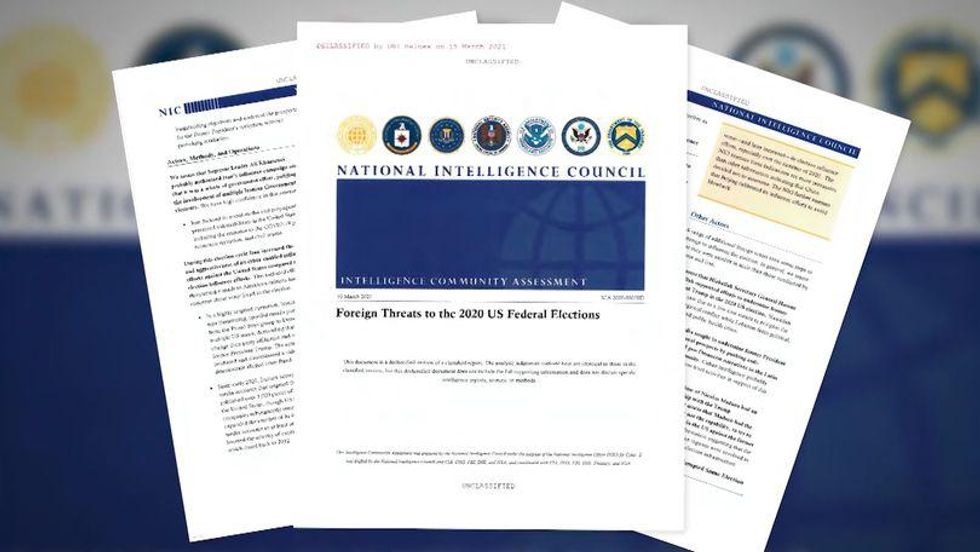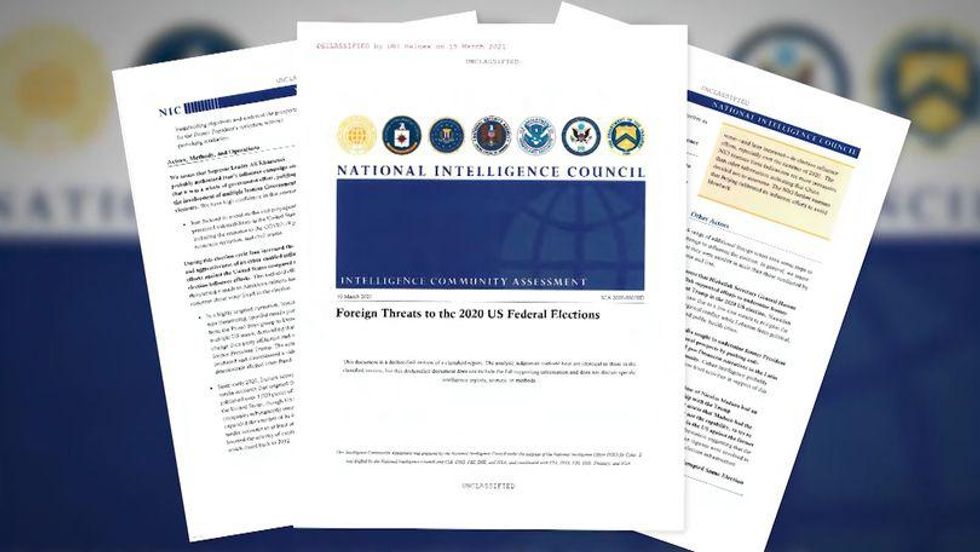
Russian Hacker
Dmitry Nogaev | Credit: Getty Images/iStockphoto
The report, titled Foreign Threats to the US 2020 Federal Election, was compiled with help from every corner of the intelligence community.
The CIA, FBI, INR, NSA, DHS, NIC, and the Treasury Department were all involved in its preparation. The bombshell report has the weight of the entirety of US intelligence behind it – and it reveals a lot.
 The National Intelligence Council AssessmentWYFF NBC 4
The National Intelligence Council AssessmentWYFF NBC 4

First, the good news: They found no evidence that any foreign power directly interfered in our election infrastructure. That means they believe that there were no successful cyber attacks on the technical aspects of the election, including voter registration, casting and counting ballots, or reporting results. The results of the election are completely secure.
The bad news is that they found a lot of evidence that multiple foreign countries tried to influence our election. The assessment defines these attempts as “overt and covert efforts or actors acting as agents of, or on behalf of, foreign governments intended to affect directly or indirectly a US election including candidates, political parties, voters or their preferences, or political processes.” Basically, they tried to influence American minds.
The majority of the report focuses on the influence operations of Russia. Russian operatives, most of whom were operating under the instruction of Vladimir Putin and the Russian government, conducted a series of influence operations “aimed at denigrating President Biden’s candidacy and the Democratic Party, supporting former President Trump, undermining public confidence in the electoral process, and exacerbating sociopolitical divisions in the US.”
So how did the Russians attempt to reach these goals? This is where the assessment gets slightly more vague. The report noted that the “analytic judgements outlined here are identical to those in the classified version, but this declassified document does not include full supporting information and does not discuss specific intelligence reports, sources, or methods.”
However, a number of methods are discussed. Most of the disinformation was spread online by way of government-sanctioned troll farms. A troll farm is an organized operation consisting of many users who may work together to generate online traffic aimed at affecting public opinion, inflaming division, and spreading misinformation and disinformation. They create false social media accounts by the thousands and use them to leave inflammatory comments, spread deliberate falsehoods, and work to influence public opinions.
The report found that Russia’s largest troll farm, the Kremlin-controlled Lakhta Internet Research (previously known as the Internet Research Agency) has only grown since its inception in 2014. In addition to their efforts from Russia, they also established short-lived subsidiary troll farms in Mexico, Ghana, and Nigeria after many of their accounts were restricted by social media platforms.
Other actors involved in spreading Russia’s messages were Russian senior national security officials and intelligence officials, Russian state media, and a whole network of Ukraine-linked individuals with ties to the Russian Federal Security Service.
Konstantin Kilimnik and Andrii Derkach are the only two people named directly in the report. You may remember Kilimnik from the 800 times he was mentioned in the Senate intelligence committee’s report on Russian interference in the 2016 election due to his close ties to Trump’s then-campaign chairman, Paul Manafort.
Kilimnik, Derkach, and associates successfully met with media conduits and US officials and “provided materials to Trump administration-linked US persons.” Apparently, they even produced a documentary that appeared on a US media network in January 2020. The report does not mention a specific network or documentary, but Business Insider has alleged that the documentary referred to is The Ukraine Hoax: Impeachment, Biden Cash, Mass Murder, which appeared on One American News Network.
That makes sense, particularly because the documentary matches the main narrative of the Russian campaign. The assessment explains that “The primary effort the IC [intelligence community] uncovered revolved around a narrative—that Russian actors began spreading as early as 2014—alleging corrupt ties between President Biden, his family, and other US officials and Ukraine.” Basically, the Hunter Biden scandal was the Russians’ brainchild.
Were the Russian trolls successful in their mission? Well, according to a December poll from Rasmussen Reports, 56% of Americans believe it is likely that Joe Biden was consulted about and perhaps profited from his son’s overseas business deals. A shocking 70% said they were following the story closely or very closely.
Russia’s influence efforts took up the majority of the report, but they weren’t the only nation mentioned. Iran also waged an information war on America; but unlike Russia, they were anti-Trump.
The assessment explains that the “whole” of the Iranian government “intended to undercut the reelection prospects of former President Trump and to further its longstanding objectives of exacerbating divisions in the US, creating confusion, and undermining the legitimacy of US elections and institutions.”
Iran, like Russia, accomplished their goals mostly online. They also used troll farms and online actors. They sent emails pretending to be the Proud Boys and threatened Democrats, and they produced and spread a video alleging to show voter fraud.
Iranian trolls created over 1,000 pieces of content that criticized Trump, identified alleged voter fraud, and played on perceived US vulnerabilities such as Covid-19, civil unrest, and the economic recession. However, the assessment does note that much of this content was subsequently removed by US social media companies.
Russia was pro-Trump and Iran was anti-Trump; but notably, Iran was not particularly pro-Biden. The assessment explains that “Tehran’s efforts were aimed at denigrating former President Trump, not actively promoting his rivals.”
You’ll notice that a common theme for both Russia and Iran was to try and make people trust America’s election system less. Both countries actively created and promoted false claims of voter fraud online, and they were incredibly successful. One month before the election, a Gallup poll showed a record low level of trust in the accuracy of America’s election system.
Even after the election, the effects of this mistrust are still being felt. In the most recent election survey by Pew Research, 76% of Trump voters incorrectly believed that Trump definitely or probably won the election, and 70% of Trump voters believed there was widespread illegal voting and fraud.
Trump himself likely owns a lot of the blame for these beliefs, but Russian and Iranian influence certainly contributed to how widely they spread and how deeply they penetrated every corner of the internet.
The most surprising part of the report is the section on China, who actually didn’t try to influence the election. “China sought stability in its relationship with the United States and did not view either election outcome as being advantageous enough for China to risk the blowback if caught,” it reads.
Basically, the assessment explains that China considered trying to influence the election but ultimately decided that since neither candidate was particularly “pro-China” it simply wasn’t worth it.
Other countries mentioned in the report were barely given a paragraph each. The report states that some factions of the Lebanese Hizballah and the Cuban government conducted some low level online influence operations that were generally anti-Trump. It also found that the Nicolas Maduro regime in Venezuela had the “intent, although probably not the capability, to influence the public opinion in the US against the former president.”
The takeaway from this report is not that our elections aren’t secure — they are — but our minds are not. The division and disinformation warfare we are seeing online isn’t just an organic result of the social media age. It is being actively engineered by foreign enemies. America is a democracy that relies on an informed populace and strong institutions to thrive, so the best way to destroy us is to make us mistrust everything.
Our enemies have realized that they could never win a war on American soil, so instead they are attacking us through our screens. They are letting us fight amongst ourselves, fanning the flames, and hoping we will destroy our country in the process. And it’s working.














